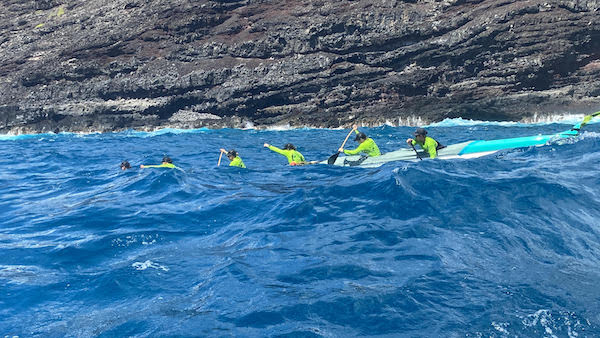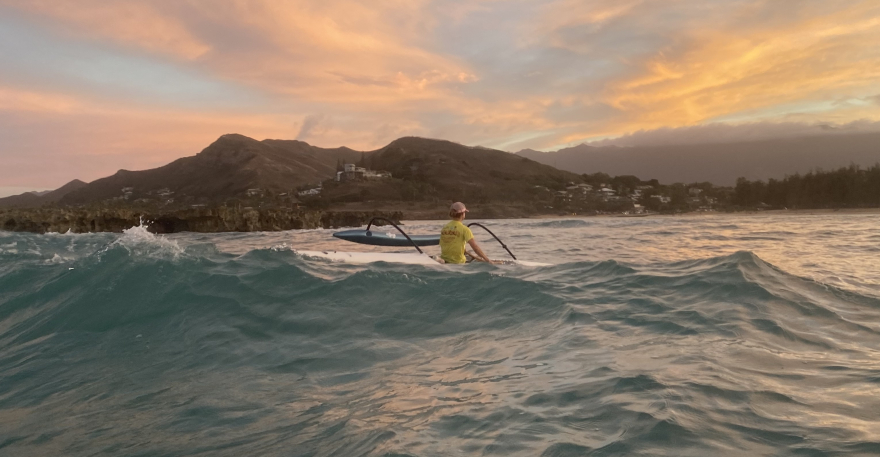Around this time of year I often get asked “how do I get better at paddling OC6?” From new paddlers wanting to progress to paddlers trying to make or stay on a particular crew, many people want to figure out how to improve their performance in the canoe.
The trouble with OC6 paddling is you don’t always have control over how your training time is spent, you can’t always tell if you are making a difference to the speed of the canoe, and if you aren’t steering, it’s not easy to learn to read the conditions.
While it’s true that it takes time to become a well rounded paddling athlete, consistent time on an OC1 is an incredible tool for speeding up your progress and improving your ability in an OC6.
If you are interested in excelling in an OC6, here are four reasons to focus on your OC1 paddling to improve your OC6 paddling.
1. Fitness
Having the strength, endurance, and power to be consistent through a training session or an event allows you to be a paddler that increases the speed of the OC6.
However, with five other people in the canoe it’s way too easy to back off on power, possibly without anyone – including yourself – even noticing.
In an OC1 you are the only one propelling your canoe so you will immediately know if your power or strength is fading.
Paddling an OC1 provides an opportunity to see where you are at, and determine what you need to do to improve.
- Some people struggle to get their heart rate up while paddling, while others may struggle to pace themselves.
- You might find that you don’t have the endurance needed to keep paddling hard to the end, or that you don’t have as much strength as you want.
- In an OC1 you can set your own training plan that focuses on what needs to improve, so you can level up your paddling fitness and make a difference in the OC6.
2. Technique
The ability to utilize your whole body to generate power and do so efficiently while blending with others is something we all want in an OC6.
The trouble is, it can be a challenge to work on technique in OC6. Often, time is limited and there are more paddlers on the water than a coach can pay attention to.
Unless your club has a structured approach with specific tools for working on technique, you might be stuck trying to interpret what is wanted without any tangible way to make a change.
In an OC1 you are in charge of how much time you dedicate to and the method you use for working on your technique.
- With a structured program that includes technique training, OC1 is the number one way to improve your paddling technique which will make you a more efficient powerful paddler that can blend well in an OC6.
3. Mental Grit
The ability to push yourself past the point of comfort during intense training intervals, a time trial, or a race, is a skill and a desired quality in an OC6 paddler.
Some people have learned this skill through different sports, while others seem to have a higher level of pain tolerance or an innate ability to sustain intense effort over long periods of time.
A progressive OC1 training program should help you develop the grit to stick with the pain, which you can use while paddling OC6.
- Our bodies are designed to be efficient and our brains to avoid pain.
- With practice, you can teach your body and your mind to embrace the discomfort from burning muscles, a pounding heart rate and deep heavy breathing.
4. Reading the Water Conditions
There is clearly a difference in speed between top OC6 teams and more novice crews and it’s not just because of the fitness of the crew or the ability of the steersperson.

A paddler who is able to anticipate the conditions and respond to them appropriately is valuable in an OC6.
I understood this through OC1 racing. People much less conditioned than I would easily beat me when the conditions got more challenging. I quickly realized that the skill of reading the water and being efficient in the conditions sets people apart.
Unfortunately if we only paddle OC6 we probably won’t get enough opportunities to train in the conditions that we need to to improve.
OC1 allows you to seek a variety of conditions and develop the ability to confidently apply power, maintain your technique, and thrive in challenging conditions.
- These skills are directly transferable to an OC6 and will make you a huge asset to the team.
When I think about my progression as an OC6 paddler over the last 20 years, I see that it was not linear, and I had many areas that needed developing. I know that consistently paddling an OC1 has been the tool that gave me the edge for my OC6 paddling.
OC1 paddling is a dependable way to become an all around solid paddler whose mental and physical skills can be applied to the OC6.
I hope you get out and enjoy time on your OC1 soon!

